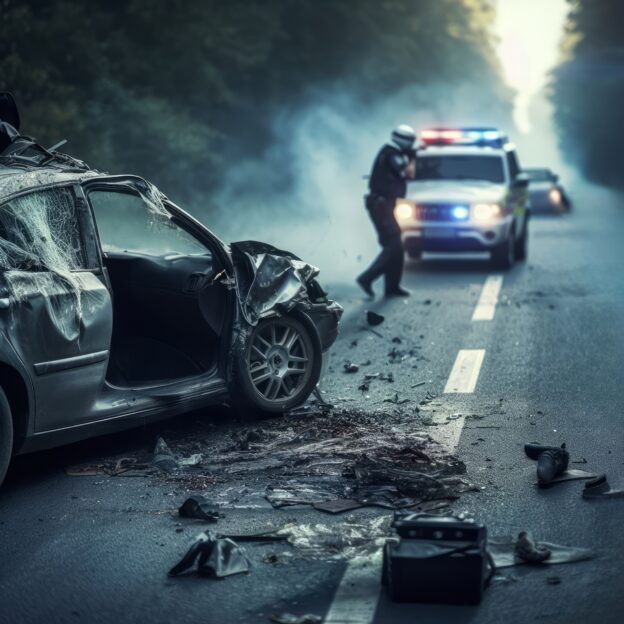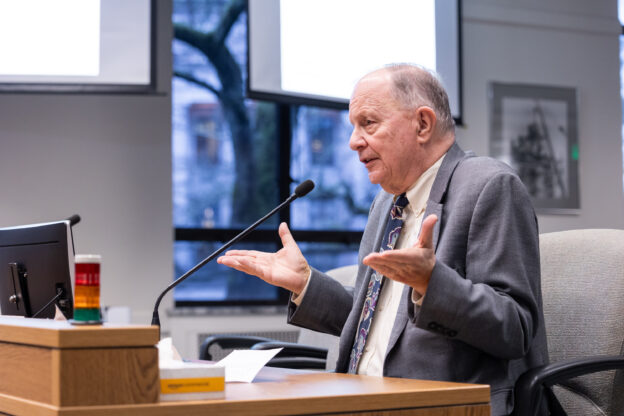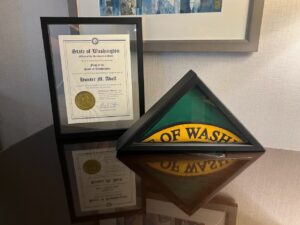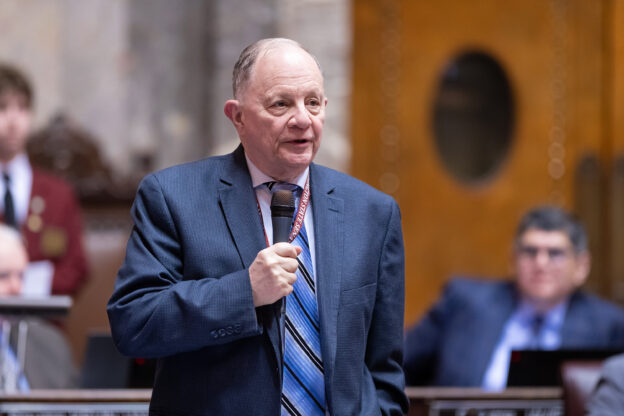
Note: The following e-newsletter was sent to Sen. Padden’s subscribers May 17, 2024. To subscribe to Sen. Padden’s newsletter, click here.
Dear friends and neighbors,
Our state is experiencing an increase in fatal and serious-injury crashes on our roads and highways that is shocking and heartbreaking. We’re failing to protect our families, friends and children.
Earlier this week, the Washington Traffic Safety Commission issued a report revealing our state has reached a 33-year high for traffic fatalities. The report showed 810 people were killed in crashes involving a motor vehicle in 2023, an increase from 743 killed in 2022.
Of the 810 traffic deaths last year, nearly half (400) involved a drug- or alcohol-impaired driver, while 251 involved excessive speed, 171 involved not wearing a seatbelt or other restraint, and 135 involved a distracted driver. What is so tragic about these fatality figures is that these deaths could have been prevented if drivers were more careful and responsible when behind the wheel.

What is especially troubling about Washington’s rise in traffic deaths is that the rest of America is driving more safely. According to a Seattle Times story about the WTSC report, Washington’s increase in road fatalities runs counter to national figures. The National Highway Traffic Safety Administration reports 40,990 people died on U.S. roads last year, a 3.6% decrease from 2022. The Times story noted that nearly every other state recorded fewer deaths than the year before.
It’s unacceptable that nearly half of the 810 traffic deaths in 2023 in our state involved impaired drivers. The Legislature has taken recent steps to reduce impaired driving, including making a fourth DUI conviction a felony and expanding the “lookback” period for reviewing prior impaired-driving convictions to 15 years, instead of 10. We also passed the initiative restoring police pursuits, which should allow officers to apprehend more bad drivers on roads and highways.
But more needs to be done! It would be good to see the Washington Traffic Safety Commission and Washington State Patrol work to increase public awareness about impaired driving so more people avoid driving after downing too many drinks or taking drugs that can impair their driving ability. The Traffic Safety Commission and State Patrol also should do more to remind drivers to keep their eyes on the road instead of focusing on their cell phones or other things that can distract them.
The Legislature also can do more to reduce impaired driving, which contributes to so many of our state’s traffic deaths. Last year, I introduced Senate Bill 5791, a bipartisan proposal, supported by the State Patrol, that would require WSP to establish a pilot program to evaluate the outcomes and effectiveness of oral fluid roadside information (basically, an oral swab) collected by law enforcement when impaired driving is suspected. (Taking the oral swab would be voluntary for drivers.) After being passed by the Senate Transportation Committee during this year’s session, SB 5791 died when it was on deck for a full Senate vote.
Several other states have implemented oral swab testing (which detects six drugs and alcohol) on suspected impaired drivers, and the results have been positive. My hope is that another legislator will sponsor this bill next year after I retire from the Senate and that the Legislature will finally pass this measure. It should help reduce impaired driving and lower the number of traffic deaths in our state.
If you have questions about how to participate in state government this year or thoughts to share on anything in this e-newsletter, please give me a call or send me an email.
Thank you, as always, for the honor of representing you in Olympia!
Best Regards,

Senator Mike Padden
Efforts to increase number of law-enforcement officers in state
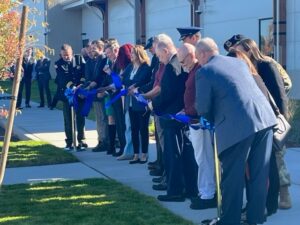
Senator Padden and other attendees during last October’s ribbon-cutting ceremony at the new law-enforcement training center run jointly by the Spokane County Sheriff’s Office and the United States Air Force.
Another reason for Washington’s rise in traffic fatalities is the lack of law-enforcement officers in our communities. Many law-enforcement agencies, anti-crime advocates and legislators have pointed out in recent years that Washington ranks dead last (51st out of the 50 states plus the District of Columbia) for the number of law-enforcement officers per capita.
Washington’s extremely low number of police officers in communities also is a key reason why crime continues to rise across our state.
An article recently published by Seattle-based Crosscut offers some reasons for the low number of law-enforcement officers across Washington, beyond the simple fact that more are leaving the profession than entering it. The net loss in officers makes it hard for the remaining officers to maintain law and order in their communities.
The Crosscut story cited several likely reasons for the drop in police officers: job pressures, burnout, frustrations, the fluctuating stigmas of being a cop, bad hours for raising a family, sometimes long commutes because an officer cannot afford to live in the city they are protecting and a lack of local money to hire new law-enforcement officers.
Many people argue that the backlash against police officers in 2020 following George Floyd’s death in Minneapolis and the ensuing demonstrations and riots in Seattle and other cities across the nation caused many officers to leave law enforcement for other jobs. The combination of “officer loss” and pro-criminal laws passed by the Democrat-controlled Legislature in recent years has contributed greatly to the increase in many types of crime in Washington, including murders, auto thefts and robberies.
Fortunately, the Legislature finally has recognized the problem of a lack of law-enforcement officers and taken steps to fix it. This part of the Crosscut article discusses what the state has done to tackle the lack of officers:
In 2022, the Criminal Justice Training Center added a campus in Spokane. This year, other satellite centers started operating in Pasco and Vancouver. Another is expected to open in Arlington later this year. One of the hurdles to training recruits is that it is difficult for many — especially those with children — to spend four and a half months in Burien. The satellite campuses are designed to address that while raising the total capacity to train 870 police recruits in 2025, plus 800 correctional officers, misdemeanor probation officers and other roles.
Another improvement is that it no longer costs local law enforcement to send their recruits in for training. Until this year, local police and sheriff’s departments had to pay 25% of the training costs for each recruit. After legislative action this year, the state is paying 100% of the bill.
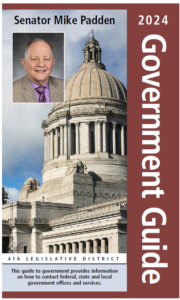
4th District Government Guide still available at many locations
As mentioned in my e-newsletter in recent weeks, there is a new 4th District Government Guide for districts residents to use. The free guide includes names and contact information for officials at the federal, statewide, legislative and local government levels. It also provides other helpful information. If you would like to have a copy of the new government guide mailed to you, please call my legislative assistant, Annalise Hemingway, at 509-921-2460 or email her at annalise.hemingway@leg.wa.gov.
There also are copies of the updated government guide at these locations:
- Millwood City Hall (9103 E Frederick Ave., Spokane)
- Argonne Library (4322 N Argonne Road, Spokane)
- Spokane Valley City Hall (10210 E Sprague Ave., Spokane Valley)
- Spokane Valley Library (22 N. Herald Road, Spokane Valley)
- Liberty Lake City Hall (22710 E Country Vista Drive, Liberty Lake)
- Liberty Lake Library (23123 E Mission Ave., Liberty Lake)
- Otis Orchards Library (22324 E Wellesley Ave., Otis Orchards)
- Spokane Valley Senior Center (2426 N Discovery Place, Spokane Valley)
Washington had largest increase for drug-overdose deaths among states
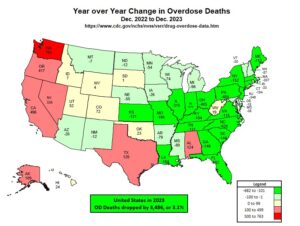
The Centers for Disease Control and Prevention (CDC) on Wednesday released its monthly report on drug-overdose deaths by state. This report covers all 12 months of 2023. A Seattle Times story reported that overdose deaths in the U.S. declined by nearly 3,500 deaths from the prior year, or 3.1%.
Unfortunately, Washington state actually is leading the nation in the increase in overdose deaths in 2023 (going from 2,763 in 2022 to 3,526 in 2023, an increase of 763). In percentage terms, this was a 27.6% year-over-year increase, only outpaced by Alaska (44.1%), Oregon (30%) and Nevada (28.9%).
To put this in perspective, California and Texas combined saw a smaller increase in overdose deaths than Washington, despite having nearly 10 times our state’s population.
When the state Supreme Court issued its Blake decision in February 2021, Washington was 31st in the country in per-capita drug overdose death rate, with a rate 20% below the national average. Washington now ranks ninth-highest in the country, with a rate over 40% higher than the national average.
West Virginia ranks first in drug-overdose death rate with 81.2 deaths per 100,000 population, followed by Tennessee (53.4 deaths), Delaware (51.6), Louisiana (49.0), Alaska (48.5), New Mexico (47.9), Kentucky (47.1), Nevada (45.7), Washington (45.3) and Maine (42.9). Oregon ranks 11th, with 42.7 deaths.
See WSDOT’s aerial photo of new Barker Road roundabout

(Photo courtesy of Washington State Department of Transportation)
Even though the recently completed Barker Road roundabout was mentioned in an earlier e-newsletter just a couple of weeks ago, the Eastern Region office of the state Department of Transportation provided this aerial photo of the new roundabout near I-90. It is worth a look.
Video shows problem with ranked choice voting
In recent years, some individuals and groups have been pushing an unusual and very rarely used voting system called “ranked choice voting“ or “RCV.”
Pierce County used ranked choice voting for a couple of years in the early 2000s before getting rid of it.
This video discusses the problems with RCV. If a bill to implement ranked choice voting in Washington had reached the Senate floor for a vote, I would have been a resounding “no.”
Receiving lifetime award

It was my honor to recently receive this lifetime achievement award from the Spokane County Republican Party for my years as a 4th District legislator.
Contact us!
If you have a question or concern about state government, please do not hesitate to contact our office. During the interim we are conducting business from our district office in Spokane Valley. We are here to serve you!
Phone: 509-921-2460
Email address: Mike.Padden@leg.wa.gov
PLEASE NOTE: Any email or documents you provide to this office may be subject to disclosure under RCW 42.56. If you would prefer to communicate by phone, please contact Sen. Padden’s Olympia office at (360) 786-7606.
To request public records from Sen. Padden, please contact Randi Stratton, the designated public records officer for the Secretary of the Senate and Senate members.












